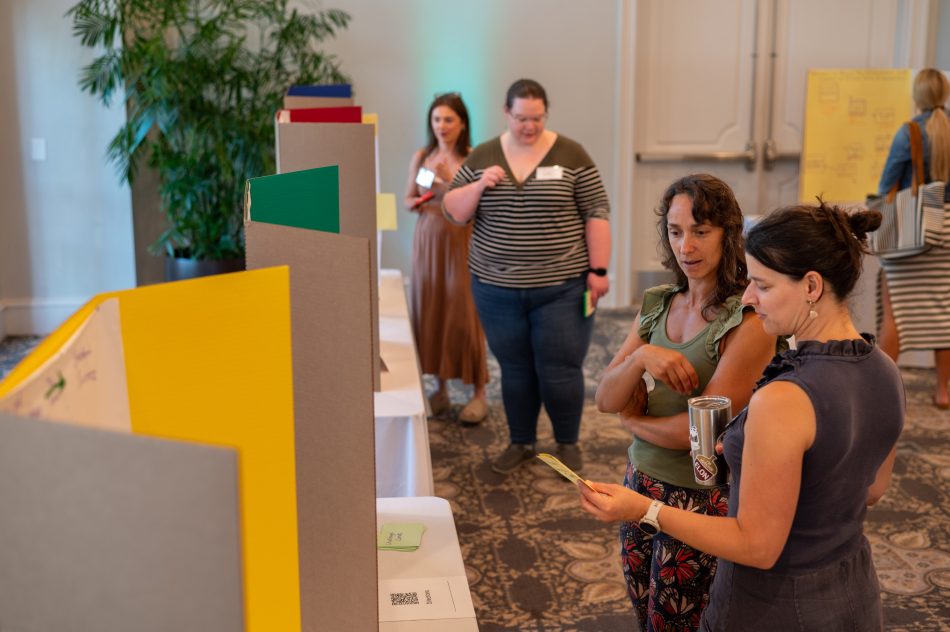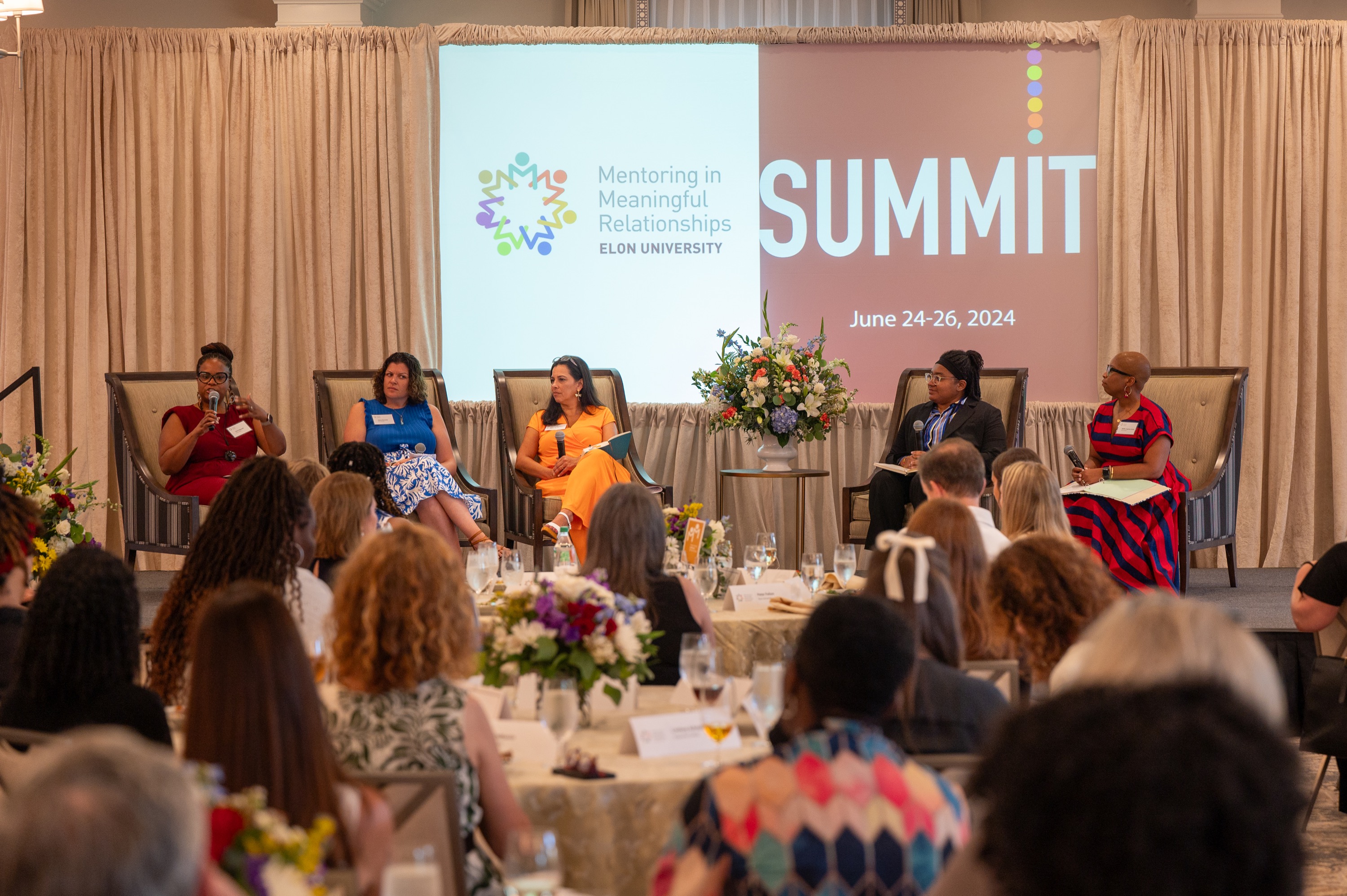Nearly 60 participants from 16 institutions gathered at Elon to share best practices for supporting the development of relationships that lead to success and professional development.
Leaders from 16 higher education institutions recently gathered at Elon University for the university’s inaugural Mentoring in Meaningful Relationships Summit, an initiative designed to share best practices for building connections between students, faculty and staff.
Across three days, nearly 60 participants worked in cross-institutional groups to find actionable ways to support the development of meaningful relationships on campus with the goal of supporting student success as well as professional and personal development. The summit culminated in each group presenting a poster detailing their work in areas including institutional leadership, signature mentoring programs, faculty engagement and development and overall student success.
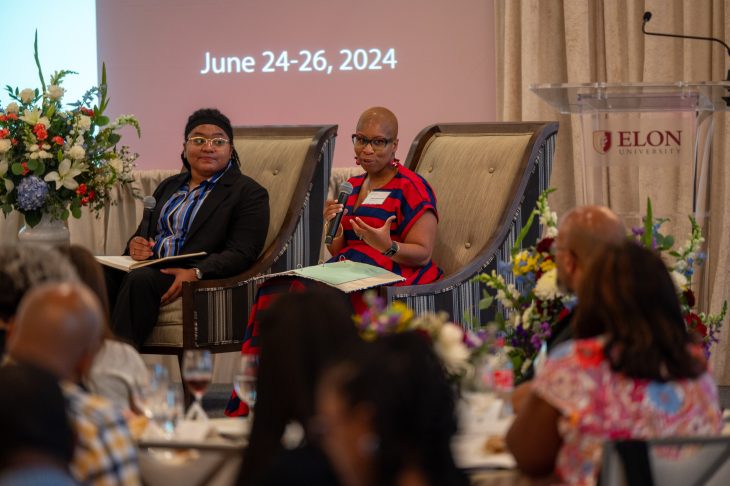
“Embrace the possibility that mentoring is valid in a variety of relationships and roles, and it is often the role of the relationship that shapes and defines the mentoring for all parties involved,” said Professor Buffie Longmire-Avital, faculty administrative fellow and co-chair of Elon’s Mentoring Initiatives Design Team. “What I’ve learned, or reaffirmed, from our collective work is that it is not just about having the ability to call or identify someone as a mentor in your life that motivates you to seek connection; it is a possibility of, and a desire to be, in relationships with others.”
The invitation-only summit, held June 24-26, gathered educators, leaders and administrators from public and private institutions, large and small, to discuss strategies to integrate and scale mentoring initiatives across campus. The summit stems from the goals of Boldly Elon, the university’s 10-year strategic plan, and the work of the Mentoring Initiatives Design Team, which formed in 2022 and is chaired by Longmire-Avital and Director of New Student Programs Emily Krechel.
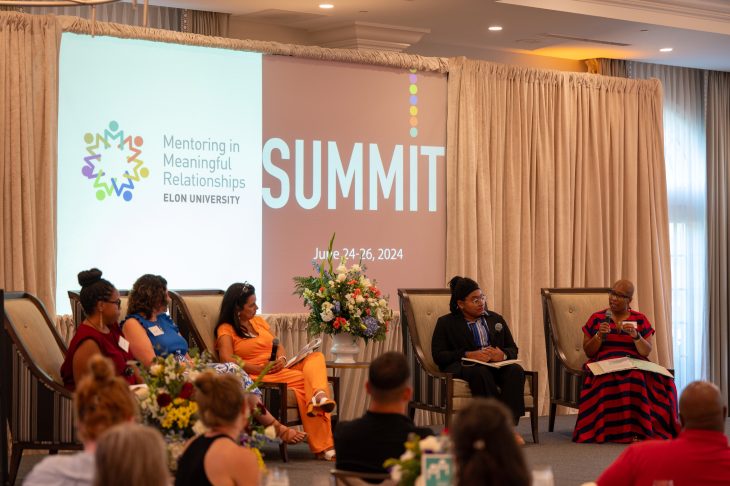
The team recently shared highlights from eight pilot programs undertaken during the 2023-24 academic year that focused on relationship development for students, faculty and staff, and the summit kicked off with a panel discussion moderated by Longmire-Avital and featuring leaders from three of the pilot programs from the past year. Each shared about their vision for an environment that assists in the cultivation of meaningful relationships.
“We all do better in relationships learning from each other and it moves in many different directions,” said Associate Professor Elena Kennedy, who was involved in a pilot program focused on supporting graduate students. “Part of that is thinking about a campus that has a strong mentoring ecosystem that, to me, is about open doors and it’s about people who are present and engaged with one another and have enough space in their day and their week that they can sit down with each other.”
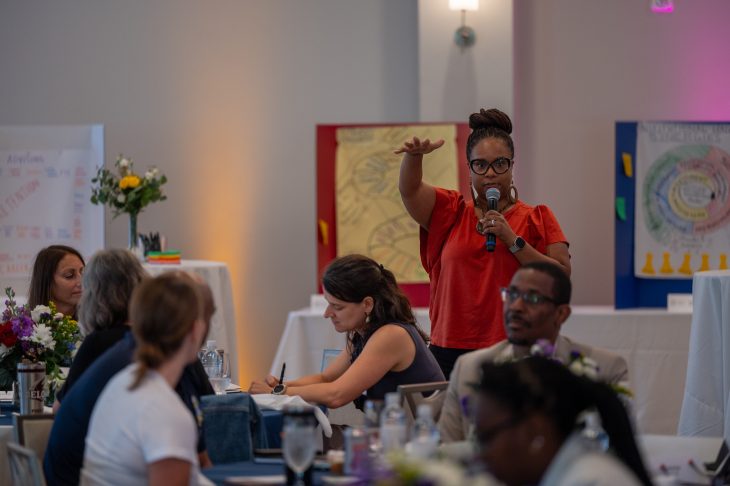
Carla Fullwood, director of inclusive excellence and development at Elon, was involved in a pilot program that focused on developing a system of tools and programs to help people develop the skills needed to effectively build relationships that can be meaningful and impactful. Just applying the label of “mentor” is typically not enough, Fullwood said. The pilot Fulwood was involved in used curated LinkedIn Learning sessions and community of practice opportunities to help participants identify the skills they may need to acquire or advance to be more effective as mentors. “Sometimes naming yourself as a mentor or even being named as a mentor by someone else doesn’t always make you an effective mentor,” Fullwood said.
The work to provide that support for the development of meaningful relationships doesn’t have to always come with the introduction of something completely new. Sylvia Muñoz, assistant dean of students and director of the Center for Race, Equity and Diversity Education, shared about her work with the SMART Mentors program at Elon, which was established decades ago to support students of color at the university and has seen great success. On a pilot basis, an intercultural competency component was introduced to the program and for the first time, faculty and staff mentors were integrated into the program to add to the peer support participating students receive.
“The faculty-staff experience was very powerful, not just for the students, but also for the faculty and staff who participated,” Muñoz said.
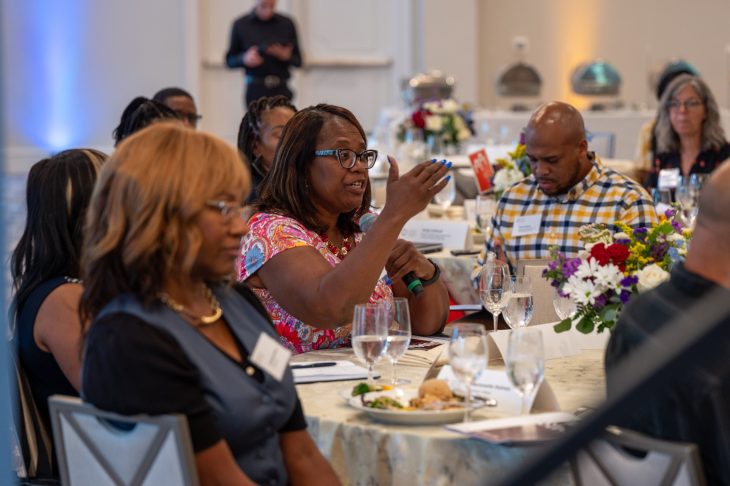
A critical component for students can be to provide support for mentoring in meaningful relationships from day one, said Destiny Payne, assistant director for new student programs. Payne helped lead a pilot that focused on building a structure to support the development of relationships by first-year students. Her experiences during the pilot helped her learn that a structure that is too rigid or includes a schedule that is too full may not be as effective.
“I learned to be flexible and to let our students be part of the process as much as possible,” Payne said. “It was important to really let them have ownership of what they wanted this to look like.”
Summit attendees had the opportunity to hear from President Connie Ledoux Book, who offered insights into why this work is so important now. Book explained that she has seen the evolution within higher education to place an emphasis on engaged learning as well as more of a focus on the science of pedagogy. Today there is more of a focus on the value proposition of higher education, she said.
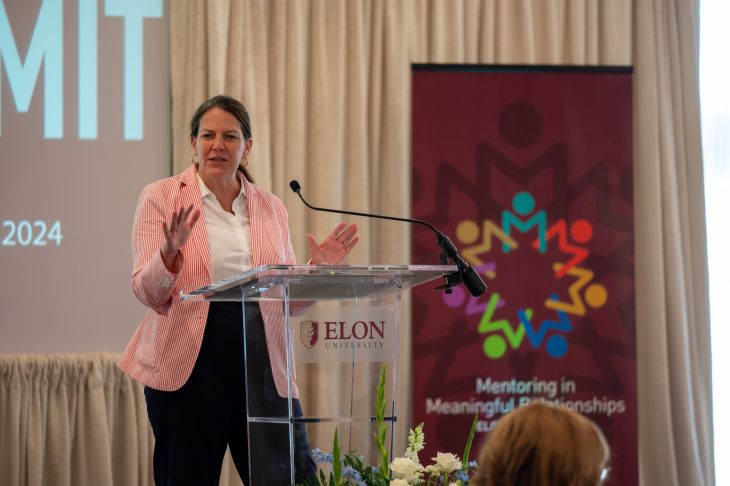
“It is very difficult for anyone to deny the transformative power of education,” Book said. “That’s why I think it is so important now that we stand up for relationships and mentoring in education. It is so transformative, and the data is clear that it changes students’ lives and we can focus on the outcomes.”
Day two of the summit featured a Provost Fireside Chat moderated by Elon Provost Rebecca Kohn who was joined by Provost Pamela Scott-Johnson of Spelman College, Provost Paul Menzer of Mary Baldwin University and Laura Furge of Muhlenberg College. These academic leaders discussed how work on mentoring in meaningful relationships can be anchored in the curriculum, the role of faculty in supporting these relationships and the use of metrics and other indicators to gauge success. Most importantly, each reflected how they endeavor to be champions and allies in this work.
Also on day two, participants grouped in cross-institutional teams undertook the work of developing a game board that would detail a path from “mentoring matters” to “student success” within their areas of focus as a way to visualize the resources that contribute to meaningful relationships. The posters were presented on the final day, with participants offered the ability to provide feedback on each poster.
“Think through how we do this well,” Longmire-Avital said to the teams. “How do we do this so we are not encouraging harm? How do we build things that last but are also flexible to move with the changing times? What are the guides, the tools, the best practices that we may be able to collectively share?”
Some of those best practices are laid out in two books authored by Elon President Emeritus Leo M. Lambert and Professor Peter Felten, assistant provost for teaching and learning and director of the Center for Engaged Learning, and the pair led a session on the summit’s final day offering some of what they’ve learned in their work.
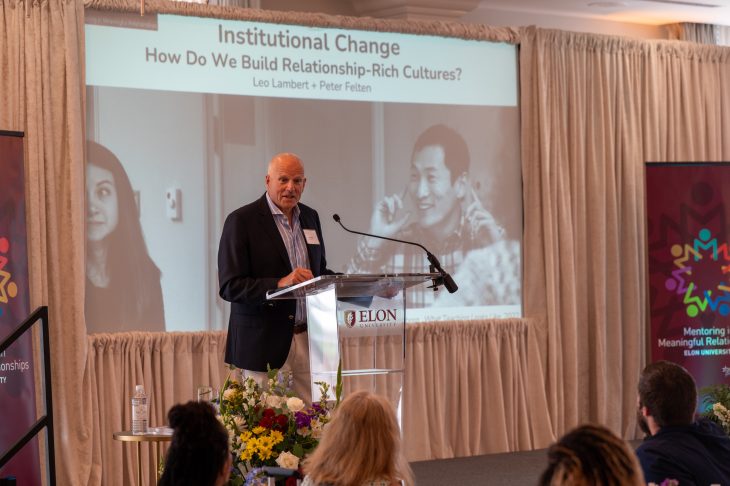
“We need to tell students more effectively that one of the most important outcomes of college is a set of relationships that are going to be valuable to them for the rest of their lives,” Lambert told the attendees. “We have to walk them through the process, and not just tell them that it’s important.”
It is important to move beyond the idea of a single mentor and relying solely on a singular relationship, Lambert said. “I think we have a lot of work to do in higher education, as we’ve talked about these last few days, in terms of de-emphasizing this one-on-one model of mentor-mentee. It’s not one-on-one. Students need many mentors.”
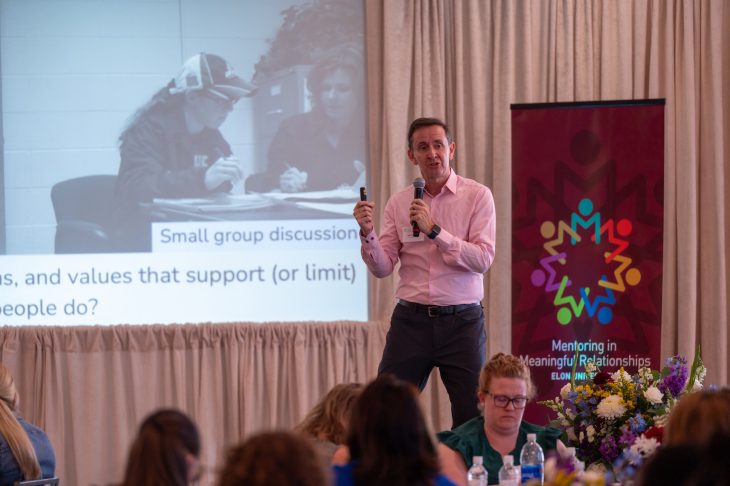
Felten shared research that has found that first-generation students have been taught and deeply believe that they have to make it through college on their own. That can make them less receptive to seeking out support networks or connections that can help them make it through a challenging experience, Felten said. “We need to teach students that you will do better, you will thrive, it will be easier and it will be more rewarding if you do it together,” Felten said.
Elon Provost Rebecca Kohn offered closing remarks, noting the value that comes from bringing together people from very different educational institutions to share, collaborate and produce something new. “As we’ve discussed strategies that are developed or are in development from a variety of perspectives, now we can think about how to apply them toward common goals on mentoring in meaningful relationships,” Kohn said.
